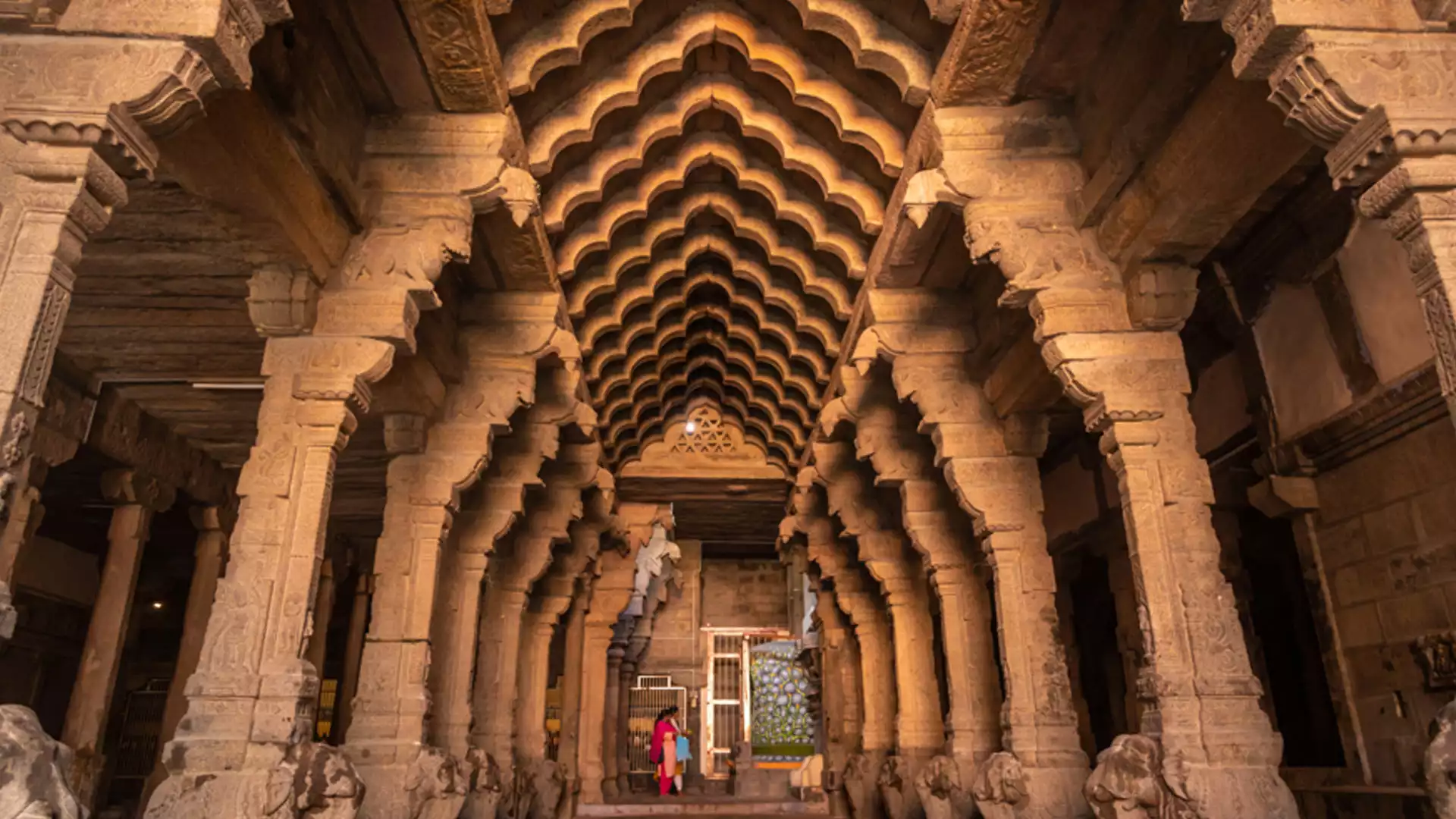




Here are some of the famous temples in Tenkasi:
The most famous temple in Tenkasi, dedicated to Lord Shiva. It is a replica of the Kashi Vishwanath Temple in Varanasi and features a majestic gopuram (tower) standing at 180 feet. The temple is an architectural marvel and a significant pilgrimage site in Tamil Nadu.
The Kasi Viswanathar Temple in Tenkasi is a famous Shiva temple modeled after the Kashi Vishwanath Temple in Varanasi. This connection gives the town its name, "Tenkasi," meaning "Southern Kashi."
The temple’s gopuram (tower) is one of the tallest in South India, standing at 180 feet. The intricate carvings and Dravidian architectural style of the gopuram are a major attraction for devotees and tourists.
The presiding deity is Lord Shiva, worshiped as Kasi Viswanathar. The temple is an important pilgrimage site, with devotees believing that worshipping here bestows the same blessings as visiting Kashi in North India.
The temple was built during the Pandya dynasty in the 13th century. It reflects the grandeur of Tamil architecture from the medieval period, making it an important historical and cultural landmark in the region.
The Kasi Viswanathar Temple is a center for religious festivals, particularly during Shivaratri and Margazhi Thiruvathirai, attracting thousands of devotees. The temple also hosts regular poojas, rituals, and other spiritual activities.
The Kasi Viswanathar Temple is not only a religious site but also a significant architectural and cultural monument in Tamil Nadu.
Located within the Kasi Viswanathar Temple complex, this temple is dedicated to Goddess Visalakshi, the consort of Lord Shiva. The temple holds great spiritual importance for devotees.
The temple is dedicated to Goddess Visalakshi, the consort of Lord Shiva (Kasi Viswanathar). Visalakshi means "one with broad eyes," and she is revered as a form of Goddess Parvati.
This temple is located within the Kasi Viswanathar Temple premises in Tenkasi. Devotees visiting the Shiva temple also worship Goddess Visalakshi for blessings related to health, prosperity, and family welfare.
Goddess Visalakshi is believed to bless devotees with a peaceful and prosperous life. Many devotees pray to her for resolving family issues and seeking well-being.
The temple plays a key role in festivals such as Navaratri and Aadi month celebrations, where special poojas and rituals are conducted to honor the goddess.
Worshiping Kasi Viswanathar and Visalakshi Amman together is considered highly auspicious. Devotees believe that it brings both spiritual benefits and material prosperity, as the divine couple is worshiped for a balanced and harmonious life.
This temple is an integral part of Tenkasi's religious and cultural heritage, attracting devotees seeking blessings from the divine mother, Visalakshi Amman.
Situated near the Papanasam Falls, this temple is dedicated to Lord Shiva in the form of Papanasanathar, meaning "the remover of sins." The temple is located in a picturesque setting, surrounded by lush greenery and the Western Ghats.
The Papanasanathar Temple is dedicated to Lord Shiva, who is worshiped here as Papanasanathar, meaning "the destroyer of sins." It is believed that taking a dip in the nearby river and worshiping at this temple cleanses devotees of their sins.
The temple is located close to the Papanasam Falls in the Western Ghats, making it a scenic pilgrimage spot. The natural surroundings of the temple, combined with the lush greenery and flowing river, add to its spiritual ambiance.
Alongside Lord Shiva, Goddess Parvati is worshiped here as Ulagammai Amman. The temple celebrates the divine couple and is an important site for those seeking blessings for health, prosperity, and family well-being.
The Tamiraparani River, which flows nearby, is considered highly sacred, and taking a bath in this river before entering the temple is a common ritual. The temple is especially significant during occasions like Maha Shivaratri and Pradosham, drawing large crowds of devotees.
The temple has Dravidian-style architecture, and its origins trace back to the Pandya dynasty. The temple’s historical significance and the beauty of its stone carvings make it an important landmark for both pilgrims and history enthusiasts.
The Papanasanathar Temple is a spiritually powerful place and an essential destination for devotees seeking forgiveness and divine blessings.
Located near Courtallam Falls, this ancient temple is dedicated to Lord Shiva as Kutraleeswarar. The temple is well known for its Dravidian architecture and serene surroundings, attracting devotees and tourists alike.
The temple is dedicated to Lord Shiva, worshiped here as Kutraleeswarar. It is believed that Lord Shiva resides here in the form of a self-manifested lingam (Swayambhu Lingam), making it a highly sacred site.
The Kutraleeswarar Temple is situated near the famous Courtallam Falls, a popular tourist and pilgrimage destination. The temple's proximity to the waterfall adds to its natural beauty and spiritual appeal.
According to legend, Sage Agastya performed penance here, and the temple is closely associated with his worship of Lord Shiva. The temple is believed to have been built by the Cholas, and its architecture reflects the ancient Dravidian style.
Kutraleeswarar Temple is sometimes considered a representation of the element of water, as it is located near waterfalls. This connection to the natural element gives it a special place among the temples dedicated to Lord Shiva.
The temple becomes a significant pilgrimage site during the monsoon season when the waterfalls are in full flow. Festivals like Shivaratri, Aadi, and Margazhi Thiruvathirai are celebrated with great devotion, drawing large crowds of devotees.
The Kutraleeswarar Temple is not only a spiritual hub but also a destination where nature and divinity come together, making it a unique and revered place of worship.
This temple is dedicated to Lord Murugan and is located in the nearby village of Ayikudi. It is known for its beautiful idol of Balasubramanya (young Muruga) and is a popular spot for devotees of Lord Murugan.
The Ayikudi Balasubramanya Swamy Temple is dedicated to Lord Murugan in his child form, known as Balasubramanya. Devotees, especially those seeking blessings for children and family welfare, visit this temple to worship the youthful deity.
The temple is situated in Ayikudi, a small village near Tenkasi, making it a serene and peaceful pilgrimage spot. It is set amidst a picturesque rural landscape, offering a calm spiritual environment for devotees.
Lord Murugan is depicted here as a young boy (Bala), and devotees pray to him for removing obstacles and for good health and prosperity. The temple is particularly popular among families seeking blessings for their children.
The temple has a rich history and is believed to have been built centuries ago during the reign of the Pandya dynasty. Its connection to the region's cultural and religious heritage makes it an important site for devotees of Lord Murugan.
Festivals like Thaipusam, Panguni Uthiram, and Skanda Shashti are celebrated with great devotion, drawing a large number of devotees. The temple is also known for its vibrant and colorful processions during these festivals.
The Ayikudi Balasubramanya Swamy Temple is an important spiritual destination, particularly for devotees of Lord Murugan, offering a peaceful atmosphere and a strong connection to Tamil religious traditions.
Situated on a hill near Tenkasi, this temple is dedicated to Lord Murugan. The temple offers a panoramic view of the surrounding landscape and is a serene spot for both spiritual seekers and nature lovers.
Thirumalai Kovil is a temple dedicated to Lord Murugan, worshiped here as Thirumalai Kumaraswamy. The temple holds great significance for devotees of Murugan and is one of the important Murugan temples in Tamil Nadu.
The temple is situated on top of a hill near Panpoli, around 15 kilometers from Tenkasi. Devotees must climb a flight of steps to reach the temple, and from the top, they are rewarded with breathtaking views of the surrounding landscape.
According to legend, Lord Murugan married Valli, one of his two consorts, at this location. The temple celebrates this divine union, and many devotees come here to seek blessings for a harmonious and prosperous married life.
The temple is known for grand celebrations during Skanda Shashti and Thaipusam. Thousands of devotees visit during these festivals to offer prayers, participate in rituals, and take part in the special poojas and processions.
The temple offers a tranquil and peaceful atmosphere, surrounded by lush greenery and hills. The scenic beauty of the hilltop location, combined with the spiritual significance of the temple, makes it a favored spot for both pilgrims and nature lovers.
Thirumalai Kovil is a significant pilgrimage center, offering devotees a serene spiritual experience, coupled with scenic beauty and rich religious history.
These temples in and around Tenkasi are well-known for their spiritual significance, architectural beauty, and historical importance.